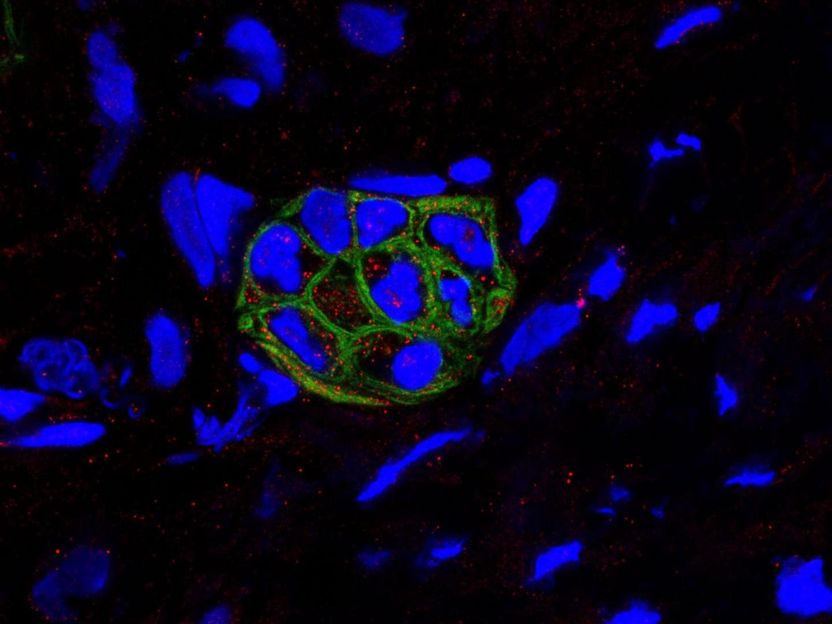Start-up CalTIC secures up to EUR 3 million in seed financing to develop a new class of drugs targeting TRPC channels
Promising new approach for the treatment of widespread conditions, including metabolic diseases, obesity, and heart hypertrophy
The KHAN Technology Transfer Fund I (KHAN-I) has committed up to EUR 3 million in milestone-dependent payments to CalTIC, a Dortmund based start-up, for the discovery of a new class of drugs.

Symbolic image
Computer generated picture
The start-up builds on a long-term collaboration between the Lead Discovery Center GmbH (LDC), the Max Planck Institute of Molecular Physiology (MPI-MP) and the University of Leeds (UoL), which resulted in the validation of transient receptor potential canonical (TRPC) channel inhibition as a promising new approach for the treatment of widespread conditions, including metabolic diseases, obesity, and heart hypertrophy. Using the proceeds, the founding partners will continue their collaboration to advance their results to preclinical stage. CalTIC’s stakeholders are UoL, LDC, the Max Planck Society (MPG), Prof. Marc Freichel, at the Institute of Pharmacology at Heidelberg University, and KHAN-I.
“The inhibition of TRPC channels presents an entirely new approach to treating metabolic and heart disease,” says Bert Klebl, CEO & CSO of LDC. “It holds significant potential for patients, and we are very much looking forward to continuing our collaboration with this group of excellent scientists and clinicians to translate it into practice.”
CalTIC’s TRPC inhibitors block binding sites that were originally discovered by Prof. David J. Beech (UoL) and Prof. Herbert Waldmann (MPI-MP) as targets of Englerin A. Results from various in vivo models support both the potency and safety of the approach of the newly developed TRPC channel inhibitors in metabolic and heart disease.
“We are delighted that KHAN-I has placed great confidence in CalTIC,” says Klaus Dinkel, CEO of CalTIC, “With KHAN’s investment and our partners’ continued commitment, we are perfectly positioned to exploit the exciting project.”
“For drugs that inhibit receptors, we refer to receptor subtypes, such as beta-adrenoceptor blocking drugs and so on. But for calcium channels, we refer to calcium-channel blockers as if there is only one type of calcium channel, yet we now know this isn’t the case - there are many. Our CalTIC therapeutic innovation partnership will target some of these new calcium channels. It’s a hugely exciting moment to see the potential for new medicines after years of effort getting to this point,” states Prof. David Beech, UoL School of Medicine.
Other news from the department business & finance

Get the life science industry in your inbox
By submitting this form you agree that LUMITOS AG will send you the newsletter(s) selected above by email. Your data will not be passed on to third parties. Your data will be stored and processed in accordance with our data protection regulations. LUMITOS may contact you by email for the purpose of advertising or market and opinion surveys. You can revoke your consent at any time without giving reasons to LUMITOS AG, Ernst-Augustin-Str. 2, 12489 Berlin, Germany or by e-mail at revoke@lumitos.com with effect for the future. In addition, each email contains a link to unsubscribe from the corresponding newsletter.
More news from our other portals
Something is happening in the life science industry ...
This is what true pioneering spirit looks like: Plenty of innovative start-ups are bringing fresh ideas, lifeblood and entrepreneurial spirit to change tomorrow's world for the better. Immerse yourself in the world of these young companies and take the opportunity to get in touch with the founders.
Last viewed contents
Jake_(rescue_dog)

Cell death mechanism may, paradoxically, enable aggressive pancreatic cells to live on
LDC and SOTIO Enter License and Collaboration Agreement for First-in-class Cancer Metabolism Program
CLIB2021- Cluster Industrielle Biotechnologie e.V. - Düsseldorf, Germany

























































